- Home
- Evelyn James
The Woman Died Thrice Page 12
The Woman Died Thrice Read online
Page 12
Mr Wignell gave a very heavy sigh.
“Miss Fitzgerald, might we talk freely? I really need to speak with someone and I rather fancy you are the sort of person who is good at keeping confidences.”
Clara was a little surprised, but she certainly was not going to deny Mr Wignell.
“I shall keep all you say between us,” she promised him.
“It is not so much that it is a secret, rather, it is such a personal matter, one that caused considerable heartache, I would not have others know about it.”
“Mr Wignell, what awful thing has happened? Is your wife quite well?”
“A little shaken,” Mr Wignell admitted. “And we seem to have misplaced her sleeping powders. It has upset her. My wife has not slept unaided these last ten years.”
“Oh,” Clara found it hard to imagine Mrs Wignell as an insomniac, she looked too determined to have anything to do with such nonsense.
“It is since our great loss,” Mr Wignell persisted. “Our daughter, our only child, perished ten years ago. She was a gift from God, given to us late in life, long after we had accepted we would remain childless. She was always a fragile thing, and taken with whims and fancies, but we both loved her dearly.”
“I am sorry,” Clara said gently. “A loss like that must be hard to bear.”
“It is Miss Fitzgerald and I fear my own stubbornness has made matters worse for my wife,” Mr Wignell grimaced with his own internal guilt.
“You are entitled to your grief as much as your wife,” Clara soothed him. “I am sure you meant no deliberate harm. Sometimes, when our emotions are raw, we do things we later regret.”
“You are kind, but you do not really understand,” Mr Wignell gave Clara a soft smile. “I was referring to my recent stubbornness, not past matters. You see, my daughter perished on the banks of Lake Windermere, and this journey was supposed to be a means of laying her memory to rest once and for all.”
Clara said nothing, she rather felt it was not her place to speak. Mr Wignell had a story to tell and interruptions would not assist. Mr Wignell tapped his fingers on the arm of his chair, with a slight cough he began his story.
“My daughter was prone to melancholy from childhood. These dark moods would come over her out of the blue. We found them hard to predict and harder to manage. She would shut herself away, refuse to eat or talk, become almost a living statue. Doctor after doctor offered hope only to disappoint us. We eventually came to the conclusion that the situation could not be cured, only managed,” Mr Wignell blinked slowly, unwanted memories surfacing in his mind. “At first the melancholia was unfortunate, but not harmful. The dark periods would pass and our lively daughter would return. When she was well she was vivacious and delightful. She loved to dance and to play music. She made me so happy, I cannot explain it Miss Fitzgerald, which was why when the dark spells came over her it made me so very sad.
“As she became older the moods became more complicated. She began to talk of harming herself. She despised who she was, she would say, she could not bear to carry on. Naturally we cajoled her and coaxed her through these periods, but we began to be afraid for her wellbeing. One Sunday, after a carriage ride which we had all enjoyed, our daughter attempted to kill herself by drinking a bottle of laudanum she found in the bathroom. There was not enough to kill her, but she was very ill. When she was recovered enough to talk, we asked her why she had done it when she seemed so happy. She looked me straight in the eye and said that was precisely the problem, she had been so very happy that afternoon and she could not imagine ever being that happy again, and the thought had caused her such despair she saw the only solution to be to take her life.”
Mr Wignell had to pause. His throat was tight with emotion and the words did not want to come out easily. Tears were threatening in his eyes, but he would not cry in public and certainly not before a young woman. He had to focus on Miss Plante and Miss Soloman, on the latter’s steady reading of the novel, to compose himself. He was glad Clara did not interrupt at this point. She just sat quietly and waited. Finally he spoke again.
“After the incident, my wife and I agreed that Susan, our daughter, must never be left alone for even a moment. But how was this to be achieved when I was at work and my wife would at times have to leave the house on errands and visits? We concluded we should find our daughter a companion. She had had tutors in the past and we would say that this was just a continuation of her education. Susan loved to draw and she loved geography. We looked about for a person who could expand on this knowledge. That was how we first came to know Mrs Hunt.”
Clara looked up sharply at this statement. There had been no indication during the last few days that the Wignells knew Mrs Hunt, certainly no sign that they had once employed her.
“I can understand your surprise,” Mr Wignell said. “Let me continue my story and you will see why we were not inclined to renew our friendship after all this time. Mrs Hunt came to us with very good recommendations. She was a little sharp for my taste, but my wife postulated that this might be just what Susan needed. We were, by our own admission, rather soft. Perhaps someone so practical and lacking in imagination as Mrs Hunt would be of benefit to her. As it happened, Susan liked Mrs Hunt and soon they were spending every day together. In the mornings they would explore Susan’s passion for geography by studying atlases and travel guides. In the afternoons Susan would draw while Mrs Hunt read to her. For a time things seemed perfect.
“Then Susan came up with the idea of a visit to the Lake District. She had been studying the lakes, they were a particular passion for her, and she wanted to see them and to sketch them. We all thought it a grand idea and the arrangements were duly made. We came to the Lakes in August, the only time I was able to get away from work. Susan spent the first few days sketching the scenery, seemingly content. On the Wednesday we went to Lake Windermere. Mrs Wignell and I wanted to relax and enjoy the view, Susan wanted to walk around the lake looking for a good sketching spot. Naturally Mrs Hunt went with her. That was the last time I saw my daughter alive. She seemed so happy, so vibrant in that moment. I had no fears for her.”
Mr Wignell’s voice trembled and he paused.
“What happened?” Clara asked softly, feeling that Mr Wignell needed to hear another voice in the room to save himself from complete distress.
“I only know what Mrs Hunt told me. She and Susan walked the banks a while until Susan saw a spot she liked and set up her easel and paper. Mrs Hunt was feeling rather hot and weary. She sat under a tree and fell asleep. When she woke the easel was still there but Susan was missing. Mrs Hunt rose and walked along the lakeside, looking for Susan. When she could not see her she walked back to the easel and saw that the sketch had been finished and the pencils set down. Confused, she walked towards the lake edge, pushing through a tall patch of reeds, perhaps imagining Susan had decided to wet her feet in the lake water to cool off. Instead, she saw Susan floating face down. She dragged her out and called for help, but it was too late.
“We can only assume one of Susan’s dark moods had suddenly overtaken her and she could not resist the lure of the water,” Mr Wignell fell quiet, he was thinking. “Naturally there was an inquest. Death by accidental drowning was concluded. Mrs Hunt was dismissed, we had no need of her services. That was the last we saw of her for many years.”
“Until you came on this holiday? That must have been a shock.”
“Yes, and then again, no. You see, my wife received a letter from Mrs Hunt. It said that the woman was ill and she was trying to resolve matters in her life before the end came. One of the things she wanted to do was return to Lake Windermere and say a final goodbye to Susan. Only, she felt she could not face going alone. She wanted our company,” Mr Wignell shook his head. “It seemed absurd at first. We had spent all these years putting the matter behind us. Why now stir it up again? But, after a while, my wife came to think the idea fitting. She thought it might help her to sleep again. So I made the arrangements. But, wh
en it came to it, I could not bring myself to speak with Mrs Hunt. Perhaps, deep down, I blame her for what happened to Susan. We treated each other like strangers.”
“And then Mrs Hunt perished in the lake like Susan,” Clara added. “Do you think it was a symbolic act?”
“I don’t know,” Mr Wignell admitted. “As I say, we did not speak with the poor woman. Perhaps, in the end, she felt guilt over Susan too.”
Or one of the Wignells had allowed emotion to get the better of their rational senses and Mrs Hunt had been murdered.
“I can understand why your wife is so upset. There is a doctor in the hotel, you know, if she requires more sleeping powders.”
“Yes, it may come to that,” Mr Wignell nodded. “But not until we are sure she has lost her supply. Probably they are tucked away in a suitcase.”
“Probably,” Clara assured him.
“It was most good of you to listen to me,” Mr Wignell continued. “Yesterday’s events stirred up an awful lot of bad memories. I truly regret coming on this holiday. It has made things a dozen times worse. We should have left the past in the past.”
Clara wondered if Mrs Hunt had thought the same before her untimely demise.
“Did Mrs Hunt say what illness she was suffering from?”
“No. But I assumed something fatal,” Mr Wignell took a handkerchief from his top pocket and dabbed surreptitiously at his eyes. “Is it awful to say sometimes I wish we had never had Susan?”
“No,” Clara corrected him. “Sometimes it feels harder to lose a precious thing, than to have never known that thing in the first place. But you must hold on to all the good memories that Susan gave you.”
“Thank you, Miss Fitzgerald,” Mr Wignell rose. “I have heard your name in Brighton. They say you are a very good investigator.”
“That is reassuring to hear,” Clara smiled.
“If you happen to come across any information about Susan, while you are examining Mrs Hunt’s case…”
Clara looked up sharply.
“I know your name and I know Mrs Hunt spoke to you,” Mr Wignell shrugged. “I suspect you are investigating, but you need not confirm it to me. In any case, if you do learn something about Susan, will you please inform me?”
“Naturally,” Clara said.
Mr Wignell gave her another nod, then wandered away. Clara sat back in her chair and turned her attention to the two ladies outside. How curious, she thought. Another piece of the puzzle had become visible, but exactly how it fitted the whole eluded her as yet.
Chapter Sixteen
The charabanc returned around 4pm. Tommy and Annie appeared in the hotel lobby. Tommy gave his sister a hug and presented her with a long, flat parcel wrapped in brown paper. It was of a reasonable weight and when she disposed of the paper she saw it was a sketching book and a pack of artist’s pencils in a little brass tin.
“Thank you Tommy,” she said, giving him another hug.
“Have you had a productive day?” Tommy asked.
“It’s hard to say,” Clara answered, “It has certainly been interesting.”
Eleanora Smythe had just appeared in the lobby and Clara smiled at her. The woman seemed oblivious, though she looked morbidly unhappy.
“That reminds me,” Clara wandered to the hotel’s front desk where the morning girl had been replaced by a man who was less inclined to smile. When Clara asked to see Mr Stover he frowned at her.
“I can assist you with most queries,” he told her bluntly, perhaps inferring from her request that she did not imagine him competent enough to deal with her concerns.
“I am sure you can,” Clara smiled. “But this is a private matter between me and Mr Stover.”
Reluctantly the gentleman went to the little office behind the front desk and summoned Mr Stover. He was smiling as he came out of the office door, until he saw Clara.
“Have there been any ‘phone messages for me?” Clara asked as soon as he came over.
“If there had been I would have informed you,” Mr Stover said coldly.
Clara was unperturbed.
“And if Miss Smythe brings you a tin…”
“I shall put it on one side and inform you, yes, Miss Fitzgerald, I have not forgotten.”
Clara pursed her lips, but bit her tongue. She had an important thing to ask and did not want to irritate Mr Stover further.
“You mentioned an Inspector Wake earlier?”
“Yes, he was the inspector around here for many years.”
“Was he the inspector ten years ago?”
Mr Stover gave her a strange look, the sort that implied he was not sure where she was heading with this question, nor whether he should be cautious or not.
“I believe so,” he said at last.
“Might you be able to tell me how to contact Inspector Wake?”
“Miss Fitzgerald, why might you want that? Inspector Gateley is investigating this case, or so I hear, and I doubt he would want his long retired predecessor poking his nose in,” Mr Stover pulled a face. “Whatever his flaws, the powers-that-be have deemed Inspector Gateley sufficient to watch over this district and all enquiries must go to him.”
Clara gave Mr Stover a polite smile.
“I actually wanted to talk to Inspector Wake about an historic case. I doubt Inspector Gateley will wish to spare me the time.”
Mr Stover gave a long sigh.
“Inspector Wake is a creature of habit. At this very moment he will be wandering along to the Red Lion, to have his supper and enjoy a glass of beer. I shall send a message to him there, asking when you can call on him. Is that to your satisfaction?”
“It is, Mr Stover, it is,” Clara assured him. “I promise you I do not do all this to try your patience. I merely wish to see justice done.”
Mr Stover’s stern façade weakened a little.
“I understand that Miss Fitzgerald,” he admitted. “I merely find it inconvenient to be discussing such things. I run a hotel, not an enquiries service.”
“Be comforted that by my efforts I might be able to find Mrs Hunt’s next of kin and so let you know who her belongings should be sent to. That will save you an effort.”
Mr Stover merely shook his head and retreated once more to his office.
Clara, Tommy and Annie made their way to Clara’s hotel room to talk over their day and update each other. There were still several hours before dinner and it was a sufficient quiet patch in which they could mull over the latest information. Clara refrained from telling them about her talk with Mr Wignell. For a start it had been a private conversation and Clara had given her word of honour that she would not share the information she was given, secondly she had yet to decide if it had any bearing on the case and thus whether it needed to be revealed. For the moment Mr Wignell was entitled to his secrets.
“Mrs Palmer has talked about nothing else but Mrs Hunt’s demise,” Annie said before she was even sat down.
Clara sat on her bed and eased off her shoes, much to the relief of her injured foot.
“Mrs Palmer is the sort of person who snatches up an idea then refuses to let it go,” Clara said, barely masking the sigh of pleasure that came with easing her discomfort. “Is she still saying Mrs Hunt was murdered?”
“That is the gist of her talk,” Tommy answered. “She really took a dislike to the woman.”
“Mrs Hunt had the audacity to criticise a fantasy that has sustained Mrs Palmer these many years. She damaged the fragile cocoon the woman lives in and which protects her from the horrific grief she must suffer if she admitted the truth. That sort of thing lends itself to a vivid hatred,” Clara explained. “Mrs Palmer is a very fragile woman under all her bluff.”
“That may be, but she is driving us all insane with her chatter,” Annie said. “Her friend, Mrs Siskin, keeps telling her to hush.”
“Poor Mrs Siskin. What of the others?”
“You saw Miss Smythe coming back into the hotel?” Tommy queried, though without waiting for an a
nswer. “She seems deeply depressed about something, but she has not revealed what. She wandered around Derwentwater quite alone and, I feel sure, at one point she was sobbing to herself.”
“I hope she didn’t eat any of those marzipan fruits she was sent!” Annie said, a sudden awful thought crossing her mind. “What if she was meant to be sent them and there is a mad man in the hotel, poisoning people at random?”
“I doubt that,” Clara tried to still her panic. “Besides, Mrs Hunt received her parcel at our previous hotel. Why would a random killer follow us all here?”
“He could be on the charabanc!” Annie said in horror, the colour draining from her face.
“I think you are getting carried away,” Clara told her friend affectionately. “Mrs Hunt’s killer, if there is one, was after her and her alone, of that I am sure. The tin sent to Miss Smythe was a mistake or something else.”
“Such as?” Tommy asked.
“For the moment I don’t know, but I am certain this is not the actions of a person who randomly kills people on charabanc tours. For a start, someone made at least two attempts on Mrs Hunt’s life, with possibly a third successful one at Windermere. A random killer is unlikely to have gone to such effort.”
Everyone agreed with that, though Annie thought she might look a little more closely at her soup before consuming it at dinner.
“Did anyone seem to take particular offence at Mrs Palmer’s talk?” Clara asked.
“There is a young couple,” Annie said. “I thought they were newly married at first, but now I don’t feel so sure. The man, he kept casting looks over at Mrs Palmer, but he may just have considered her speaking out in poor taste.”
“The driver was very nervy today,” Tommy added. “Seemed all out of sorts, but then I suppose that comes from having one of your passengers die on you.”
“Aside from that, was Derwentwater nice?” Clara decided they had played detective long enough.
“Beautiful!” Annie exclaimed, “I didn’t realise any place in England could seem so… ethereal. The mist was still rising off the water and it seemed so fantastical. I can see why artists are so inspired when they come here.”

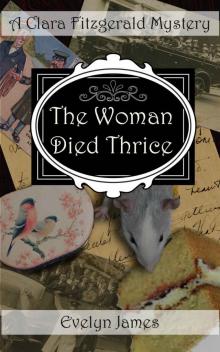 The Woman Died Thrice
The Woman Died Thrice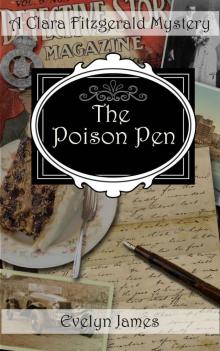 The Poison Pen
The Poison Pen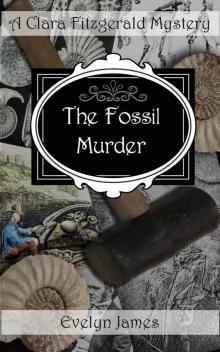 The Fossil Murder
The Fossil Murder The Green Jade Dragon
The Green Jade Dragon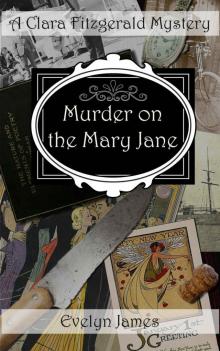 Murder on the Mary Jane
Murder on the Mary Jane Murder and Mascara
Murder and Mascara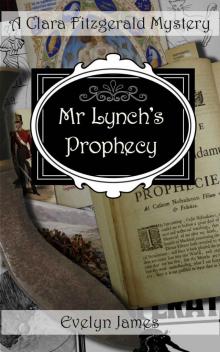 Mr Lynch's Prophecy
Mr Lynch's Prophecy The Traitor's Bones
The Traitor's Bones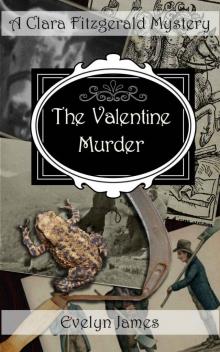 The Valentine Murder
The Valentine Murder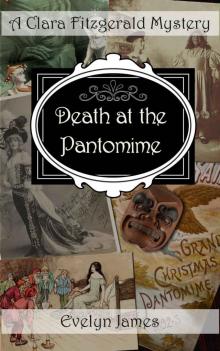 Death at the Pantomime
Death at the Pantomime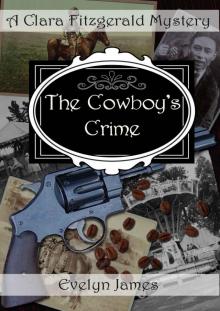 The Cowboy's Crime
The Cowboy's Crime The Trouble With Tortoises
The Trouble With Tortoises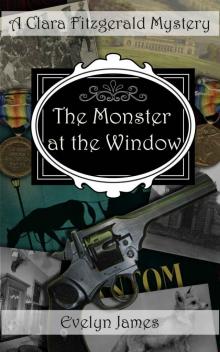 The Monster at the Window
The Monster at the Window